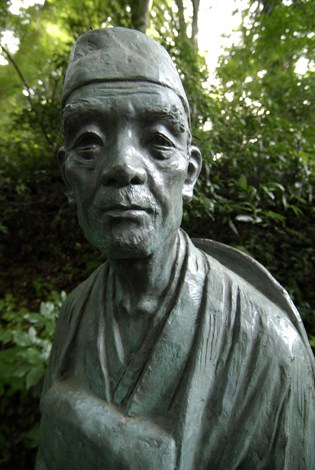If you wish, you can hear the sermon as it was preached from the UCJ pulpit. Simply click the play button below:
Delivered at the United Church of Jaffrey
August 13th, 2017
1 Kings 19:9-14 | Matthew 14:22-33
As you know, I presided over my first wedding here at the United Church of Jaffrey yesterday.
And this circumstance led to the unusual appearance of yours truly in the office on Friday afternoon so that I could be a be here for the wedding rehearsal.
Shortly after I arrived, our very own beloved Sandi Carland turned up. She was here to help June fold the bulletins.
I did not know that Sandi helps June fold the bulletins. Apparently she does it every Friday…
Thank you Sandi.
June stacked the printed the bulletins on the filing cabinet and Sandi started folding them. After a couple minutes of this, she abruptly stopped mid-fold and walked over to me, opened the bulletin in front of me, and pointed at the sermon title…
“Plop?”
“Yes,” I said. “It’s not what you think!”
And so now, my friends, I will tell you what I told Sandi – “Don’t worry,” I said. “By ‘plop’ I’m not talking about what that seagull just did on your windshield.
No.
I mean to suggest that “Plop” is a profound theological idea.
At least that’s where I’m trying to get to this morning.
Let’s see if I get there.
*
Those of you who make a habit of reading the “Poetry corner” before services begin, will already have a clue to where I’m going.
The poem – which was a favorite of my late father – is quite short, so if you will allow me, I will read it for you. It goes like this:
The Old Pond
A Frog jumps in
Plop!
This poem was written by Matsuo Basho, a Japanese Buddhist poet who lived in the 1600’s.
It was translated form the Japanese by the writer and Zen Buddhist thinker Alan Watts.
The word “plop,” here, is Alan Watt’s translation of the Japanese words “mizu no oto” which might be more accurately translated as: “the splash of water.”
And, indeed, there are other English speaking poets who have translated this poem in this, more technically accurate way.
But my father, who was Japanese himself, preferred Alan Watt’s translation.
He preferred “plop.”
I think he preferred the word plop, because plop is a sound, not the description of the sound.
I can imagine, Watts (and my father) would have preferred the sound itself. Something like “____.”
But how do you spell that?
“Plop” is not perfect. It is still a kind of description. But it’s not as much of an idea as “the splash of water.”
“Plop” is as close as you can get to the sound a frog makes when it jumps into an old pond, while still using language.
*
Last Sunday we talked about the way story works.
We used the story of Jacob wrestling with the angel, and we discussed the way Biblical narrative often sets up the conditions for a moment of pure drama, which changes a person.
Conditions.
Drama.
Change.
Remember?
The conditions were carefully setup: Jacob sends his family across the river. He is alone in the wilderness. It gets dark.
And then, the drama: A stranger attacks him.
And then, finally, the change: The stranger blesses renames him.
This is one way that Biblical narrative works…
And this is way of storytelling: conditions, drama, change … is one that we also find occurring again and again in our lives.
And since we live human lives that develop over long periods of time, this makes sense to us.
But this, of course, is only one way of thinking about story – one way of thinking about change.
Another way that the Bible tells story, and teaches us something, is through the “plop” method.
The pond is still.
And then, suddenly
Without warning – plop!
Plop is sudden
Plop is unexpected.
Plop comes from nowhere.
Plop makes ripples.
Plop has effects that move across the surface of the pond.
Plop changes everything.
*
I suggest that the two scripture readings that Deb read for us this morning are both plop stories.
Now it is certainly true that in both stories, there are conditions that develop, and there are moments of drama, and there is change.
But both these stories – the story of Elijah meeting God, and the story of Jesus walking on water – both of these stories take unexpected turns at the last moment.
The conditions suggest one thing, but the story does something unexpected.
I call this plop.
The old pond is the essence of stillness… and then
Plop!
a great and strong wind rent the mountains, and broke in pieces the rocks
but the LORD was not in the wind;
and after the wind an earthquake,
but the LORD was not in the earthquake;
and after the earthquake a fire,
but the LORD was not in the fire;
Where is the LORD?
and after the fire a still small voice.
And when Eli’jah heard it, he wrapped his face in his mantle
and went out and stood at the entrance of the cave.
This is unexpected.
I thought God would be in the wind.
Or in the earthquake.
Or in the fire.
But no.. God was not in any of those powerful events..
But isn’t God powerful?
The story demonstrates the power of God.. But the story suggests that a still small voice is more powerful then the wind, more powerful than an earthquake.
more powerful than a fire.
What, then, is a still small voice?
Plop!
*
In the story about Jesus walking on the water, that Deb read from the Book of Matthew, there are also a number of conditions, (it’s the end of the day, Jesus send off his disciples in a boat and goes off to pray himself, a storm comes up)
There is a moment of drama: Jesus walks out onto the water.
And there is change: The disciples bowed down and worshiped Jesus.
Where is the plop?
If the plop is the unexpected, then maybe it is the moment when Jesus appears walking on water…
This is the miraculous moment, and miracle is something unexpected.
But I would place the plop moment in a different place in this story.
When Jesus says to Peter “O man of little faith, why did you doubt?” the traditional interpretation is that Jesus is telling Peter that if he (Peter) just had more faith, he could have walked on water.
But there is another way to read the moment.
Peter walks out on water.
He gets frightened.
And then he starts to sink into the water.
He cries for help.
Jesus catches him and saves him, and then says: “O man of little faith, why did you doubt?”
I prefer to think that this moment – the moment that Jesus saves Peter – is the plop moment.
We knew that Jesus performed miracles.
But did we have perfect faith that he would save us?
Plop!
*
In both these stories, the fireworks of the story is not the crucial center of the story.
The crucial element is more ordinary.
A small voice is more ordinary than an earthquake.
A hand outstretched is more normal than walking on water.
And this, is what I’ve been trying to get to all morning.
Miracle – the plop moment –
The, sudden, unexpected event that comes from nowhere but makes ripples that move across the surface of the pond, changing everything…
This miraculous plop,
Can be caused by something as normal as a frog.
So this is my suggestion for the theological meaning of “plop.”
“Plop” is an ordinary moment that changes everything.
Let me give you an example.
This happened a number of years ago. My mother was still alive.. She was fragile, but she still liked to go for short walks now and then.
I remember one afternoon.
I was busy working on something out on the front porch – I can’t remember what it was, but I think I was quite involved with it, and perhaps a little frustrated.
Mom came up to me.
“Would you like to take a walk?” she asked.
“No.” I said.
“OK” she said.
But I stopped what I was doing.
I really liked walking with her. But I really wanted to continue what I was up to.
“Wait a second.” I said.
I went into the house and found my daughter Isabel, who, must have been about 15 years old.
“Grandma wants to go for a walk,” I said. “Why don’t you go with her.”
Isabel thought about it for a moment. She was watching something on her computer.
“No,” she said.
“Wrong answer” I said.
“What?”
“That’s the wrong answer.” I said again. “You should go.”
She looked at me. After a moment, she said, “OK.”
About a year ago – 6 years or so after my mother died – I was having a conversation with Isabel.
“Do you remember that time,” she said, “When you told me I had to go walking with Grandma?”
“Yes,” I said.
“I always remember that,” she said. “I always treasure that. I’m so glad I went with her.”
Plop!
*
Brothers and sisters in Christ…
Last night, at 11:30, I finished my sermon with that loving tale about my mother and daughter.
And then, this morning I awoke to the news coming out of Charlottesville.
In Charlottesville Virginia, yesterday, there was a large protest.
A coalition of White Nationalist and Neo-Nazi groups gathered in Charlottesville yesterday to protest the city’s plan to remove a statue of Robert E. Lee from a municipal park.
A counter-protest also gathered, made up of local faith based groups, businesses and University of Virginia students and faculty.
Violence broke out.
And at 12:30 yesterday, a 2010 Dodge Challenger sped at full speed into a crowd of counter protesters, killing one woman and injuring 19 others.
Now, obviously, the conditions of that led up to this moment have been part of the tortured soul of this country since its founding.
This violence is an instantaneous expression of a dysfunction that is built into the American psyche.
A pickup truck was seen here in Jaffrey yesterday, driving around with a confederate flag flying.
I think of the two stories we have heard this morning.
Is God in the wind? The Earthquake? The fire?
Or is God in the small voice?
The hand, outstretched?
Where is God?
Where is love?
As Christians, these are the questions we must answer.
And the answers to these questions must be a part of how we respond to hatred and bigotry.
How do we take ordinary, quiet, miraculous love, and change the world?
How?
Amen.


